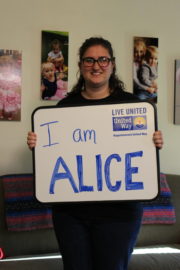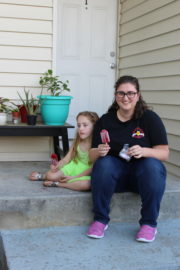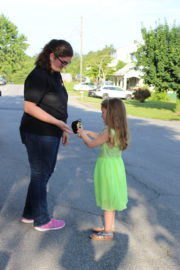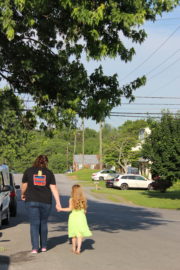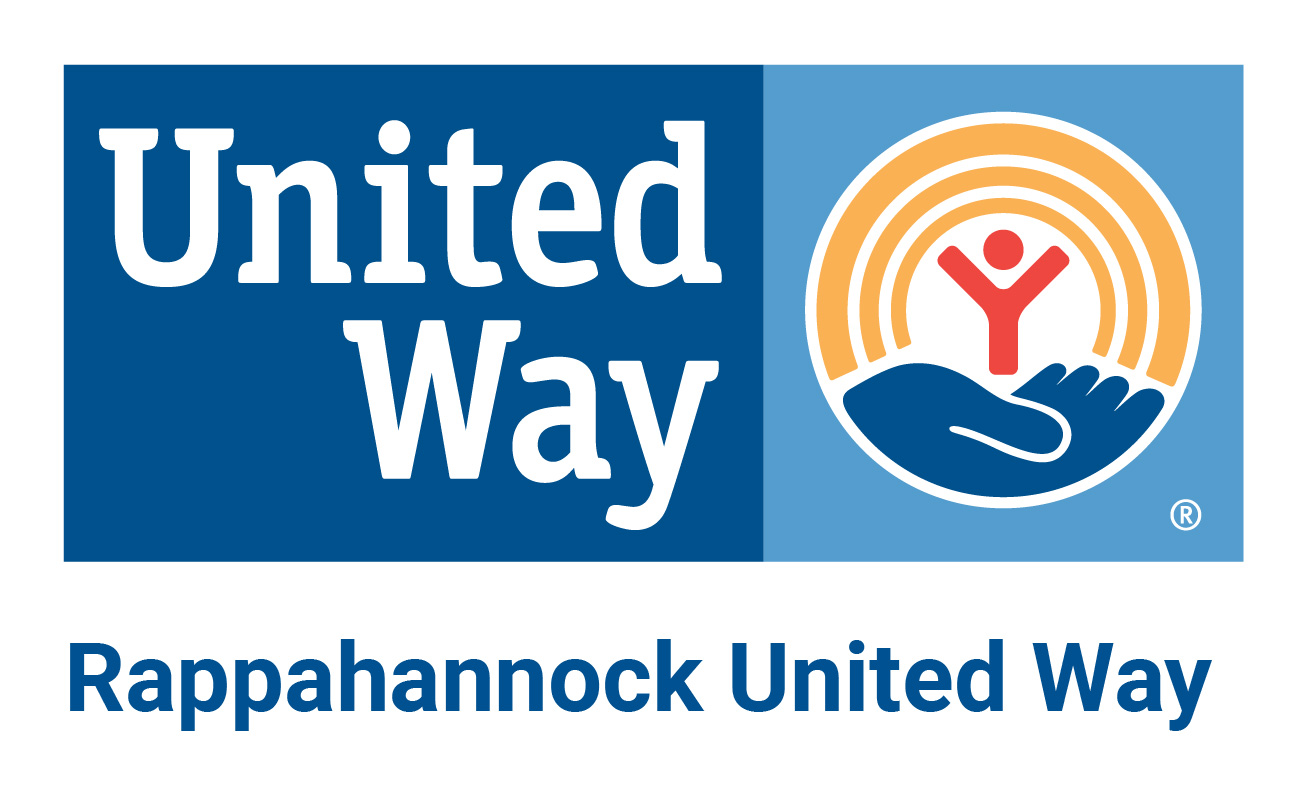Bills are Juggling Act for Hard-Working Single Mom
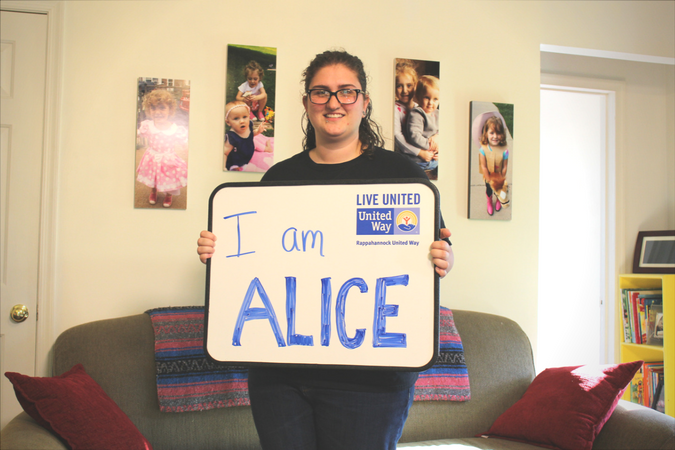
When five-year-old Ryland Graves brings home an invitation to a friend’s birthday party, her mom Taylor has a tough decision to make.
Taylor has a full-time job that supports her and Ryland, but her income doesn’t provide everything they need. There typically isn’t enough money in her budget for extra purchases like unplanned birthday gifts.
“My income, it’s kind of the bare minimum,” said Graves, who relies on working as much overtime as she can in order to pay her bills. “It’s just enough for us to get by. We could pay rent, and have groceries, and that would be it. Electric would probably be out of the question. T.V., anything fun, would be out. I make just enough to scrape by. I work a lot of overtime. If I didn’t, we wouldn’t be able to live here. It’s really important for rent, for groceries. Just my normal hours, they don’t really cut it.”
Graves is not alone.
More than 39% of households in Virginia are unable to afford the high cost of living and struggle to make ends meet. United Way refers to these households as Asset Limited, Income Constrained and Employed – also known as ALICE.
ALICE individuals and families have income above the Federal Poverty Level, but not high enough to afford a basic household budget that includes housing, childcare, food, transportation and healthcare.
Taylor Graves is a prime example of an ALICE household. She is forced to make tough choices for her and her daughter on a regular basis.
“We never have trouble putting food on the table,” said Graves. “I’ve always got dinner for Ryland. But, if we want anything a little bit more extravagant, if we want to plan a nice dinner for the family to come over, that’s just not something that’s in the cards. Sometimes our electric bill is a bit higher, and that’s difficult. If we have any kind of vehicle trouble whatsoever, that’s a big problem. If anything goes wrong, it can cause big issues for me.”
Recently, Taylor faced a major issue with her vehicle.
“I had this horrible car that I was paying way too much for, and I couldn’t afford it,” said Graves, who ended up doing a voluntary repossession for the car after talking it over with her father. With no car, Graves wouldn’t be able to get to work. Luckily her father was able to purchase a vehicle and has allowed her to drive it.
“Not having to worry about a reliable car or car payment has lifted such a huge weight off my shoulders,” said Graves. “Without that, I really don’t know where we would be. I think I would have lost my job by now, because I wouldn’t be able to get to and from work. It’s just been a helpful, helpful thing that they’ve done.”
ALICE households live in every county and city in Virginia – urban, suburban, and rural – and they include women and men, young and old, and all races and ethnicities.
The cost of daycare is another problem many ALICE households face.
“Daycare – it’s the bane of my existence,” said Graves, who pays by the day and also asks her family to watch Ryland to cut down on childcare costs. “Daycare itself, the place that she goes to, is great. They’re great people. I only pay $30 a day whenever she’s going, but even that can stack up quickly. If one week she has to go four days a week, I’m then looking at 30 more dollars, which doesn’t sound like a lot, but that’s a tank of gas. That’s a couple meals at the grocery store that we’re then not purchasing.”
For ALICE families, every penny is critical.
“Even though I’m working full time, it’s still a struggle every day,” said Graves, who knows exactly how much is in her bank account at all times because it’s a constant battle of deciding what she can and can’t afford. “As soon as I wake up in the morning, it’s on my mind. What are we going to have to give up today?”
When bills are due, Graves feels like it’s always a juggling act.
“Rent is definitely my top priority,” said Graves, who rents month to month. “Very closely followed by food. Most months I’m putting something off. Recently I had gotten a pretty hefty bonus from work which was great. It tided us through for a while. We’re getting back to where I’ve utilized my savings from that bonus. Now it’s like, ‘Okay, do I pay my credit card a little bit early or do we wait on that and make sure that the electric is paid because I’m not sure how much it’s going to be.’ Definitely, it’s something that monthly is a struggle.”
How do we help hard-working Virginians like Graves? Rappahannock United Way is currently leading the way in Virginia to help figure out how to best help ALICE households. In July 2017, United Ways across Virginia will unveil the first statewide ALICE report. This report will clearly show us who ALICE is, where ALICE lives, and how ALICE struggles in the state of Virginia.
Graves thinks more affordable housing would make a big difference for her.
“There’s a lot of places in my area that are income based, but I make too much to be considered,” said Graves. “There’s actually a place three minutes down the road from where I work and it’s income based. It’s a great little section of apartments. They have a pool and a playground but I just can’t get into something like that. More affordable housing would be fantastic.”
Although Graves tries to remain upbeat and positive, the stress she’s under isn’t always easy to manage. She worries about how the situation impacts her daughter and she does everything she can to keep their spirits up.
“With Ryland I don’t want her to see me struggling so I try to hide it as much as possible and keep the positivity and keep everything light and fun,” said Graves, who treasurers her daughter’s great sense of humor and intelligence. “We do a lot of dancing and a lot of singing and that’s free so we’re good. I’ve definitely got incentive to keep things positive with her.”
When Graves pictures the future, she imagines owning a home and maybe having a dog.
“Just somewhere where the streets are quiet, Ryland can play, she can ride her bike and we don’t have to worry about cars speeding down the road,” said Graves. “That would really be the ideal dream for me.”
In the meantime, Taylor Graves believes there are many people in need and is committed to giving to United Way to help.
“I usually do a dollar per paycheck just because I can’t really afford a lot,” said Graves, who gives to United Way through her employer with an automatic deduction from her paycheck. “I don’t make a lot of money myself, so giving any little bit, it does kind of hit the wallet. But, I figure a dollar a paycheck to help someone who may be in a worse situation than me is definitely worth it.”
Want to know more about ALICE or how you can help? Click here www.VirginiaALICE.org
